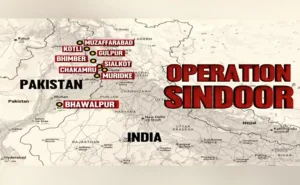Rajasthan – The Delhi Police’s Special Cell has made a significant breakthrough in national security by arresting a 34-year-old man from Rajasthan’s Bharatpur district on serious espionage charges. The accused, Mohammad Kasim, a Muslim cleric, stands accused of facilitating Pakistan’s Inter-Services Intelligence (ISI) operations by supplying illegal sim cards to Pakistan for anti-national activities.
This arrest represents a critical development in India’s ongoing efforts to combat cross-border espionage networks that threaten national security through sophisticated communication channels and intelligence gathering operations.
The Accused and His Criminal Operations

Mohammad Kasim’s arrest has exposed a complex web of espionage activities involving illegal sim cards to Pakistan that were being systematically used by Pakistani intelligence operatives. The investigation revealed that Kasim maintained regular contact with his ISI handlers through encrypted messaging applications and various social media platforms, demonstrating the sophisticated nature of modern espionage operations.
The accused received specialized training in espionage techniques, including methods for gathering sensitive information, transmitting classified data, and establishing secure communication channels with Pakistani intelligence handlers. This training enabled him to effectively coordinate the supply of illegal sim cards to Pakistan while maintaining operational security.
Also Read: YouTuber Jyoti Malhotra Confession Exposes Talks With Pakistan Officials Before Pahalgam Attack
Also Read: Priyanka Senapati Exposed: Shocking Connection to Jyoti Malhotra Spy Case
Intelligence Breakthrough and Investigation Timeline
The investigation into illegal sim cards to Pakistan began in September 2024 when intelligence agencies received credible inputs indicating that Indian mobile numbers were being systematically exploited by Pakistani intelligence operatives for espionage purposes. These mobile connections were being illegally smuggled across the border by Indian citizens working as ISI agents.
During the development of this intelligence, Kasim’s name emerged as a key figure in the illegal sim cards to Pakistan smuggling network. Subsequent investigations confirmed his direct involvement in multiple trips to Pakistan, where he received instructions and training from ISI personnel.
Cross-Border Travel and ISI Connections
Investigation records reveal that Kasim made two significant trips to Pakistan that directly facilitated the illegal sim cards to Pakistan operation. His first journey occurred in August 2024, followed by a second trip in March 2025. During these visits, which totaled approximately 90 days, he met directly with ISI personnel who provided him with detailed instructions for his espionage activities.
These meetings in Pakistan were crucial for establishing the illegal sim cards to Pakistan supply chain and for receiving specialized training in intelligence gathering techniques. The ISI handlers provided Kasim with specific protocols for maintaining secure communications and avoiding detection by Indian security agencies.
Family Involvement and Expanding Network
The investigation has revealed that Kasim’s brother also played a significant role in the illegal sim cards to Pakistan operation. Currently absconding and suspected of working directly for the ISI, the brother reportedly accompanied Kasim on his trips to Pakistan to receive anti-India assignments and coordinate espionage activities.
This family-based network approach demonstrates how the illegal sim cards to Pakistan operation was designed to maintain operational continuity and reduce the risk of complete network compromise if one member was arrested or compromised.
Surveillance and Detection Methods
The Special Cell’s success in uncovering the illegal sim cards to Pakistan network resulted from comprehensive surveillance operations that combined both manual observation and sophisticated electronic monitoring techniques. This multi-layered approach enabled investigators to track Kasim’s activities and confirm his role in supplying Indian SIM cards to ISI agents.
The surveillance revealed that these illegal sim cards to Pakistan were being strategically used to contact and manipulate Indian citizens, attempting to lure them into sharing sensitive information about Indian Army operations and government officials through secure messaging and calling applications.
Targets and Sensitive Information Gathering
Initial questioning of Kasim has revealed the specific objectives behind the illegal sim cards to Pakistan operation. His ISI handlers had instructed him to gather and transmit photographs and detailed information regarding sensitive Indian defense installations located in Rajasthan, including critical data about troop movements and artillery placements.
This intelligence gathering mission demonstrates how the illegal sim cards to Pakistan network was designed to support broader Pakistani intelligence objectives against Indian national security interests. The information sought could potentially compromise Indian military operations and strategic positioning along the border regions.
Legal Framework and Charges


Kasim has been formally charged under relevant sections of the Official Secrets Act (OSA), with a First Information Report (FIR) registered at the Special Cell police station. These charges reflect the serious nature of the illegal sim cards to Pakistan operation and its potential impact on national security.
The Official Secrets Act provides the legal framework for prosecuting espionage cases and ensures that individuals involved in illegal sim cards to Pakistan operations face appropriate consequences for their actions against national interests.
Court Proceedings and Custody
Following his arrest, Kasim was produced before a Delhi court, which granted police custody for further interrogation. This custody period will allow investigators to gather additional information about the illegal sim cards to Pakistan network and identify other potential collaborators or beneficiaries of this espionage operation.
The court proceedings represent a crucial step in ensuring that the full extent of the illegal sim cards to Pakistan operation is thoroughly investigated and that all responsible parties are held accountable for their actions.
Operation Sindoor Context


This arrest occurs within the broader context of “Operation Sindoor,” India’s covert offensive launched on May 7 in Pakistan in retaliation for the April 22 Pahalgam terror attack that resulted in 26 tourist casualties. The illegal sim cards to Pakistan case demonstrates the ongoing nature of cross-border intelligence operations and the need for continued vigilance.
National Security Implications




The illegal sim cards to Pakistan case highlights the evolving nature of modern espionage threats and the sophisticated methods employed by hostile intelligence agencies. The use of Indian mobile connections for Pakistani intelligence operations represents a significant security vulnerability that requires ongoing monitoring and countermeasures.
This case underscores the importance of robust counter-intelligence operations and the need for continued cooperation between various security agencies to combat illegal sim cards to Pakistan networks and similar espionage operations.
Final Word
The arrest of Mohammad Kasim represents a significant victory in India’s fight against cross-border espionage networks. The uncovering of the illegal sim cards to Pakistan operation demonstrates the effectiveness of Indian intelligence agencies in detecting and disrupting sophisticated espionage activities that threaten national security interests and territorial integrity.

